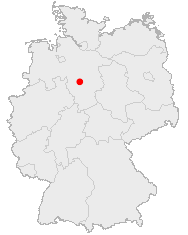| Revision as of 19:26, 5 June 2005 editHalibutt (talk | contribs)Autopatrolled, Extended confirmed users, Pending changes reviewers34,067 edits rv in accordance with the Talk:Gdansk/Vote (''Reverts to confirm with community consensus are excluded from the 3RR rule'')← Previous edit | Revision as of 20:05, 5 June 2005 edit undoSciurinæ (talk | contribs)Autopatrolled, Rollbackers12,786 edits rvt you have your discussion now, you have illustrated your pointNext edit → | ||
| Line 4: | Line 4: | ||
| <div style="float:right;margin:0 0 1em 1em;">]</div> | <div style="float:right;margin:0 0 1em 1em;">]</div> | ||
| '''Hanover''' (]: ''Hannover'' |
'''Hanover''' (]: ''Hannover'' ), on the river ], is the capital of the state of ] (''Niedersachsen''), ]. It is also the capital of the surrounding ] and ]. Population: 515,219 (2001). Auto registration prefix: H. It is located at {{coor dm|52|22|N|9|44|E|}}. | ||
| ==History== | ==History== | ||
Revision as of 20:05, 5 June 2005
- Alternate meanings: Hanover (district), Hanover (region), Hanover (state), other uses

Hanover (German: Hannover ), on the river Leine, is the capital of the state of Lower Saxony (Niedersachsen), Germany. It is also the capital of the surrounding Hanover district and region. Population: 515,219 (2001). Auto registration prefix: H. It is located at 52°22′N 9°44′E / 52.367°N 9.733°E / 52.367; 9.733.
History
The town was founded in medieval times on the bank of the river Leine (the original name Honovere may be translated to "high bank"). It was a small village of ferrymen and fishermen, which became a comparatively large town in the 13th century. In the 14th century the main churches of Hanover were built, as well as a city wall with three town gates to secure the city.
In 1636 the Duke of Calenberg decided to move his residence to Hanover. His duchy was afterwards known as the Duchy of Hanover (see: House of Hanover). His descendants would later become kings of Great Britain; the first of them was George I, who ascended to the British throne in 1714. Three kings of Great Britain were at the same time princes (Electors) of Hanover. George III elevated the title to King of Hanover. The town expanded to the opposite bank of the Leine and grew considerably.
During the Seven Years' War on July 26, 1757 the Battle of Hastenbeck took place. The French army defeated the Hanoverian Army of Observation, leading to the occupation of Hanover.
After Napoleon imposed the Convention of Artlenburg (Convention of the Elbe) on July 5, 1803 about 30,000 French soldiers occupied Hanover. The convention also meant the disbanding of the army of Hanover. George III did not recognize the Convention of the Elbe and made an effort to recruit foreign troops. As a result a great number of soldiers of Hanover eventually emigrated to England leading to the King's German Legion which later played an important role in the Battle of Waterloo.
In 1837 the personal union of the United Kingdom and Hanover ended as William IV's heir in the United Kingdom was female, and Hanover could be inherited only by males. Hanover continued as a kingdom until 1866, when it was annexed by Prussia. After the annexation, the people of Hanover opposed the Prussian regime. Nevertheless, the growth of Hanover continued until World War II, when two thirds of the town were bombed to ruins. After the war, Hanover became famous for hosting commercial expositions such as the CeBIT and the Hanover Fair. In 2000, Hanover hosted the Expo 2000.
Sights



- Marktkirche (church, 14th century)
- Altes Rathaus (old town hall, 15th century)
- Neues Rathaus (new town hall, 1901-1913)
- Leineschloss (the former castle of the kings, today the seat of Lower Saxony's government)
- Herrenhäuser Gärten (botanical gardens) - also the annual international fireworks contest held in these gardens
- Gehry Tower
- Hermesturm
- VW Tower
- Telemax
Recommended Day Trips:
- Hildesheim: beautiful medieval town famous for its UNESCO-cultural heritage Cathedrals, marketplace and old half-timbered houses
- Hamelin (Hameln): the beautiful town is famous for the folk tale of the Pied Piper of Hamelin
Towns named after Hanover
Airports
Hanover and the sourrounding countryside is served by Hanover/Langenhagen International Airport
Miscellaneous
Note: Hanover is the correct English spelling, even though the German spelling is with double N. It should always be used for the British House of Hanover, even if you choose to write the city the German way.

There are several universities in Hanover:
- Hanover Conservatory
- Hanover Medical School
- School of Veterinary Medicine Hanover
- University of Hanover
There is one University of Applied Science and Arts in Hanover:
Famous quarters of Hanover:
The rock bands Scorpions and Fury in the Slaughterhouse are originally from Hanover.
See also
External links
- City's own website
- City Panoramas - Panoramic Views of Hannover's Highlights
- FemBio Special: Notable Women of Hanover
- Hannover Messe - Hannover Fair.